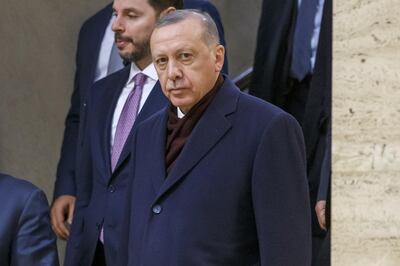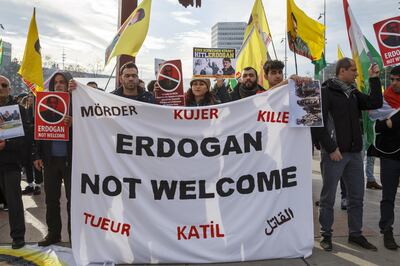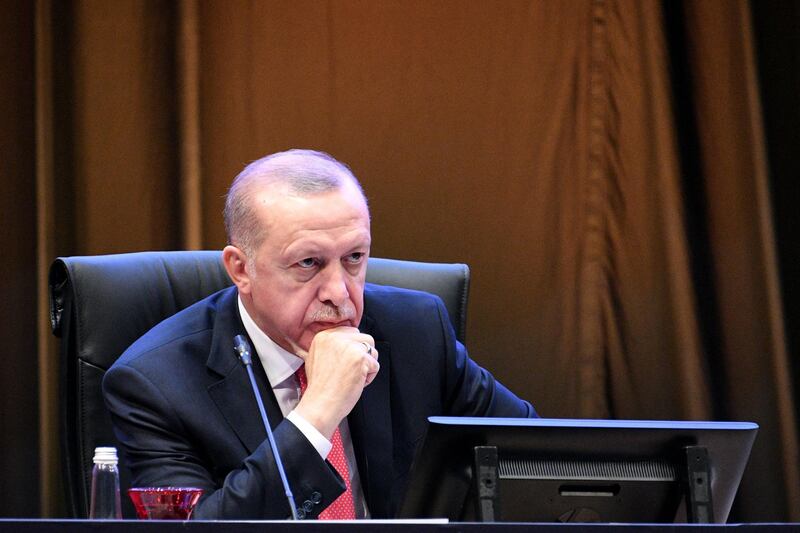President Recep Tayyip Erdogan's relationship with his US counterpart Donald Trump has been one of the most closely watched aspects of his foreign policy in recent months, but the Turkish leader's increasing untrammelled European ties are equally compelling.
After a phone call with Mr Erdogan earlier this year, Mr Trump surprised his own officials by announcing a drawdown of American troops in Syria.
The decision provoked a momentous series of events that is still playing out. Mr Erdogan took the US withdrawal as a green light to pursue a cross-border incursion into northern Syria.
Russia, meanwhile, edged its troops forward as far as the town of Manbij north of Aleppo and the regime in Damascus intensified its efforts to retake Idlib province from rebel forces.
Whatever one might make of the Turkish leader's relationship with Mr Trump, clear limits exist on how far he defies his Nato ally Washington.
There are few constraints on Mr Erdogan, however, when it comes to Europe, which he appears to regard increasingly with contempt.
The Europeans should hold great sway over Turkish policymakers. Turkey's primary economic partner invested heavily in Mr Erdogan as a new kind of reformist leader. Increasingly scratchy, the partnership went into a tailspin when Mr Erdogan survived a military coup in 2016.
The Turks have since accumulated leverage as the Europeans inverted Theodore Roosevelt's most famous foreign-policy maxim, adapted from a west African proverb, to "speak softly and carry a big stick [to] go far". European foreign ministers instead talk softly to Mr Erdogan but carry no stick.
The great wave of nearly one million Syrian and Iraqi refugees heading for Europe in the middle of the decade changed everything. It was stemmed by a deal with Mr Erdogan. In return for billions of euros, the Turkish leader policed the country's borders to stop the migration across the Mediterranean.
The Syrian invasion has granted Mr Erdogan renewed leverage over Europe on the issue of refugees. Last week the new prime minister of Greece Kyriakos Mitsotakis warned that the numbers reaching his country were rising sharply. The Greek leader predicted a rise to six figures next year.
Meanwhile the Turkish authorities are relaxing the clampdown along the southern coastline.
The pressure that even modest increases in new arrivals can put on the Europeans is immense. That fact that has not gone unnoticed by Mr Erdogan.
Europe could be said to have left itself vulnerable. Collectively, the group of nations has not dealt with the crisis. The burden has fallen too heavily on a few states. There was not enough solidarity to resettle the refugees.
On the contrary, hardline stances prevail. Denmark last week approved the deportation of asylum seekers after it deemed Damascus a safe destination.

Last week's threat from Mr Erdogan to send one million Syrians to the so-called safe zone that his troops are carving out in Syria has provoked condemnation from across Europe.
Having talked about making up the shortfall in US troops with French and British forces, the Europeans could not follow through.
The subsequent warnings that people who have claimed refugee status cannot be forced to return to a conflict zone had no impact on Mr Erdogan. Indeed, he travelled to a refugee conference in Geneva last week to reiterate his earlier threat.
The recent signing of two accords with the UN-backed Government of National Accord (GNA) in Tripoli was a dagger aimed at the heart of Europe's Mediterranean interests.
The prospect that Turkey will bolster the GNA with forces and supplies that move under the noses of European navies is an audacious breach of faith. Italy last week condemned the GNA calls for help.
Already failing German efforts to convene a diplomatic summit early next year to reboot the Libyan peace process now look doomed, thanks to Mr Erdogan's meddling.
The maritime agreement with Tripoli delineates exclusive economic zones in a way that is prejudicial to European interests.
Greek officials have sought to use wider European clout to thwart Mr Erdogan but to no avail.

It is becoming an established pattern. Mr Erdogan has also tried to encroach on natural gas basins in the Mediterranean, defying the protest of the Cypriots, Israelis, Greeks and Egyptians.
It is not only in the security and foreign-policy sphere where Mr Erdogan is brusquely shoulder-charging the Europeans out of the way. He is also meddling in other countries' domestic affairs as well.
Relations with Berlin are in a virtual deep freeze over Mr Erdogan's frequent trips to community and religious centres in German cities.
With new levels of audacity, Mr Erdogan promoted a visit to a newly built Cambridge mosque during the Nato summit in London earlier this month. There is no evidence that the British government, his nominal hosts, had any say in the trip and it is bound to have overstretched police resources.
A former repository of great European hopes, Mr Erdogan is now a force untethered from any moderating influence.
Damien McElroy is the London bureau chief of The National





